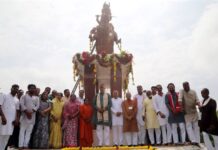PREFACE:
It would be extremely vital to note that while ruling on a very significant legal point, the Delhi High Court in a most learned, laudable, landmark, logical and latest judgment titled Pracheen Shiv Mandir Avam Akhada Samiti vs Delhi Development And Others in W.P.(C) 12817/2023 and CM APPL. 50476/2023 (Stay) and cited in Neutral Citation No.: 2024:DHC:4423 that was reserved on May 8, 2024 and then finally pronounced on May 29, 2024 while clearly refusing to make the deity a party to a petition pertaining to the removal of a temple that had been constructed in an unauthorized way on the Yamuna river bed held in no uncertain terms that, “It goes without saying that Lord Shiva does not need our protection; rather, we, the people, seek his protection and blessings. There could be no iota of doubt that Lord Shiva would be happier if the Yamuna river bed and flood plains are cleared of all encroachments and unauthorised construction.” It must be definitely noted here that the Delhi High Court made the observations while refusing to set aside an order for demolition of the Pracheen Shiv mandir that is situated at Geeta Colony which is close to the flood plains. We ought to note that the Court granted the society 15 days to remove the idols and other religious objects in the temple and shift them to some other shrine. The Court also made it indubitably clear that if they fail to do so, the Delhi Development Authority is directed to ensure that the idols are placed in some other temple.
INTRODUCTION:
At the very outset, this brief, brilliant, bold and balanced judgment authored by the Single Judge Bench comprising of Hon’ble Mr Justice Dharmesh Sharma while outlining the reliefs sought by the petitioner puts forth in para 1 that, “The petitioner society is invoking the extraordinary jurisdiction of this Court under Article 226 of the Constitution of India, seeking writ of mandamus or any other appropriate writ seeking quashing and setting aside of the order of demolition given for the Pracheen Shiv Mandir, situated near Taj Enclave, Geeta Colony. Following are the reliefs sought by the petitioner by way of this present writ petition: –
“I. Pass an order for quashing and setting aside the Notice/ Order with regard to demolish of Pracheen Shiv Mandir.
II. Pass an order directing the respondents to place on record all the orders/decisions/file/noting with regard to the demolition of Pracheen Shiv Mandir situated near Taj Enclave in Geeta Colony.
III. Pass an order directing the respondents to ensure that the Pracheen Shiv Mandir situated near Taj Enclave in Geeta Colony Akshardham Temple near Metro Station is kept operational and open for the use of devotees.
IV. Pass an order directing the respondents to ensure that no demolition drive shall take place until the speaking order being passed by the concerned authorities.
V. Pass any such directions or order which this Hon’ble court deems fit and proper in the facts and circumstances of the above-mentioned case.””
BRIEF FACTS:
To put things in perspective, the Bench while elaborating on the facts of the case enunciates in para 2 that, “The petitioner society in the present writ petition is Prachin Shiv Mandir, formally registered under the Society Registration Act, 1860, as “Prachin Shiv Mandir Avam Akhada Samiti” (Petitioner Society) bearing registration No. District East/Society/2053/2018, which is claimed to have been established by a distinguished priest, renowned for founding 101 Shiv Linga’s, and the temple on the site stands as one of these revered Shiv Lingas. It is averred that the temple acts as a central hub for spiritual community activities, drawing approximately 300 to 400 devotees regularly, who convene to engage in prayer and worship.”
As it turned out, the Bench then enunciates in para 3 that, “It is stated that the petitioner society was duly registered in 2018 with the aim of upholding transparency, accountability, and responsible management of the temple’s assets. On 25.09.2023, the SHO2 , Police Station Geeta Colony visited the temple and informed the petitioner society of the police’s directive to demolish the temple. Despite the petitioner society’s request for a formal notice, they were informed that none was available, and the actions were purportedly based on instructions from the Deputy Commissioner of Police.”
ANALYSIS AND DECISION:
As we see, the Bench then observes in para 13 that, “I have given my anxious consideration to the submissions made by the learned counsels for the rival parties at the bar. I have meticulously gone through the entire record of the case. It is pertinent to mention that as recorded in the order sheet of 23.11.2023 of this Court, learned Counsel for the petitioner requested ten days’ time to seek instructions to remove the idols to some other place or temple but instead the petitioner has chosen to press for the reliefs in the instant writ petition.”
Briefly stated, the Bench then lays bare in para 14 stating that, “Thus coming to the merits, first things first, the additional pleas canvassed by the learned counsel for petitioner that the State of UP is the land owning authority and the DDA has no locus standi does not hold any water. Firstly, because there is filed no documents to show that the land in question was part and parcel of the decision in the above referred suit between the State of UP and the DDA. Secondly, the learned standing for the DDA has relied on the Memorandum of Understanding dated 16.02.2022 executed between the State of UP and DDA, whereby the entire work/project relating to project estimate for rejuvenation of the Uttar Pradesh portion of river Yamuna flood plain (Eastern bank) between old iron railway bridge to ITO barrage in Delhi State has been entrusted to the DDA. A copy of the said agreement has been placed on the record.”
Be it noted, the Bench notes in para 19 that, “The findings in the aforesaid report have not been assailed by the petitioner. Further, it is borne from the face of the record that the petitioner society, which was by its own admission registered in 2018, has miserably failed to place on record any documents with regard to its title, right, or interest in the subject land in question, and there is no proof on record of the temple in question having any historical significance.”
In brief, it is worth noting that the Bench while citing the relevant case law notes in para 21 that, “It is pertinent to mention that in a recent case decided by this Court in the case Ankit Mishra v. Santosh Sharma, Ex.F.A.42/2023 dated 06.05.2023, in a similar facts and circumstances akin to this case, the position of law was explained as under :
71. The principles that distinguish private temples from public endowments or public temples are apparent from the extracts from the decisions cited supra, and, for ease of reference, they have been italicised and underscored. It is needless to redirect them. Suffice it, however, to say that the fact that the public worship at a private temple, even with free access, does not ipso facto indicate that the temple is a public temple. Neither does the land on which a private temple is constructed vest in the deity, merely because the public are allowed to worship there. What is of essence is the purpose for which the temple was constructed and dedicated to the deity consecrated in it, and the purpose for which the temple has been thrown open to the public. The onus to establish that the temple, though initially privately constructed, acquires public character with the passage of time, is all the persons who asserting.”
CONCLUSION
Most significantly and as a corollary, the Bench then mandates in para 23 what constitutes the cornerstone of this notable judgment stating that, “In view of the forgoing discussion, this Court unhesitatingly finds that the petitioner society has miserably failed to demonstrate any legal rights existing with it so as to continue to use and occupy the civic property for running the temple services. The half-hearted plea by the learned counsel for the petitioner that Lord Shiva, being the deity of the temple, must be also impleaded in the present matter is a desperate attempt to give an altogether different colour to the entire dispute to sub-serve the vested interest of its members. It goes without saying that Lord Shiva does not need our protection; rather, we, the people, seek his protection and blessings. There could be no iota of doubt that Lord Shiva would be happier if the Yamuna River bed and the flood plains areas are cleared of all encroachments and unauthorised construction.”
Resultantly, the Bench then inevitably holds and directs in para 24 observing that, “In view of the foregoing discussion, the present writ petition is dismissed. However, the petitioner society is given 15 days time to remove the idols and other religious objects in the temple and to place the same in some other temple. If they fail to do so, the respondent DDA is directed to ensure that the idols are placed in some other temple, or as may be directed by the Religious Committee if they are approached for any suggestions.”
What’s more, the Bench then clarifies and postulates in para 25 that, “Lastly, the DDA shall be at liberty to carry out demolition of the unauthorised construction, and the petitioner society and its members shall not cause any impediment or obstacles in such a demolition process. The local police and the administration shall render full assistance in the said process in order to maintain law and order.”
Finally, the Bench then concludes by directing in para 26 that, “The present Writ Petition along with pending application (s) is disposed of accordingly.”
Sanjeev Sirohi, Advocate,
s/o Col (Retd) BPS Sirohi,
A 82, Defence Enclave,
Sardhana Road, Kankerkhera,
Meerut – 250001, Uttar Pradesh.
Disclaimer
The information contained in this website is for general information purposes only. The information is provided by TodayIndia.news and while we endeavour to keep the information up to date and correct, we make no representations or warranties of any kind, express or implied, about the completeness, accuracy, reliability, suitability or availability with respect to the website or the information, products, services, or related graphics contained on the website for any purpose. Any reliance you place on such information is therefore strictly at your own risk.
In no event will we be liable for any loss or damage including without limitation, indirect or consequential loss or damage, or any loss or damage whatsoever arising from loss of data or profits arising out of, or in connection with, the use of this website.
Through this website you are able to link to other websites which are not under the control of TodayIndia.news We have no control over the nature, content and availability of those sites. The inclusion of any links does not necessarily imply a recommendation or endorse the views expressed within them.
Every effort is made to keep the website up and running smoothly. However, TodayIndia.news takes no responsibility for, and will not be liable for, the website being temporarily unavailable due to technical issues beyond our control.
For any legal details or query please visit original source link given with news or click on Go to Source.
Our translation service aims to offer the most accurate translation possible and we rarely experience any issues with news post. However, as the translation is carried out by third part tool there is a possibility for error to cause the occasional inaccuracy. We therefore require you to accept this disclaimer before confirming any translation news with us.
If you are not willing to accept this disclaimer then we recommend reading news post in its original language.













